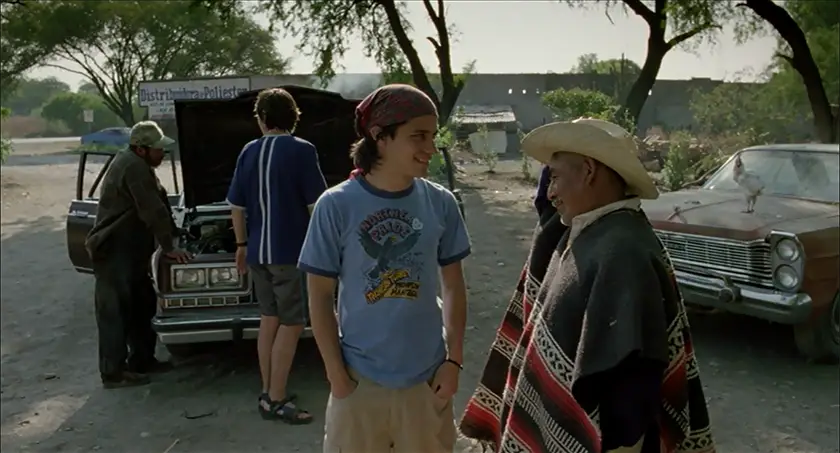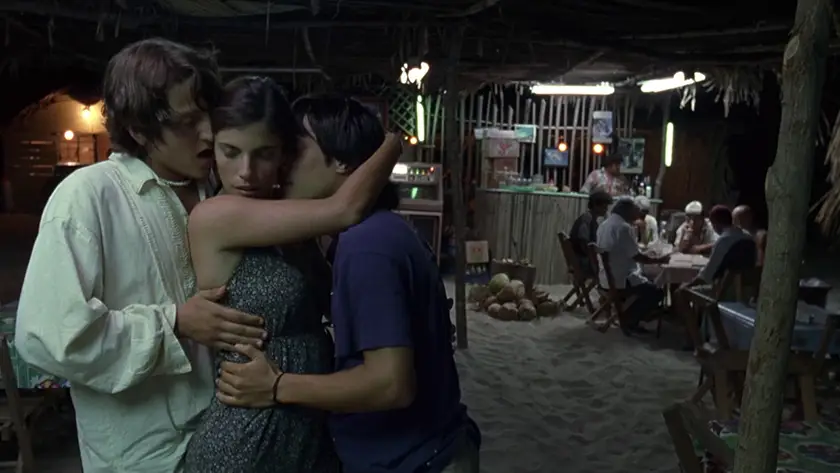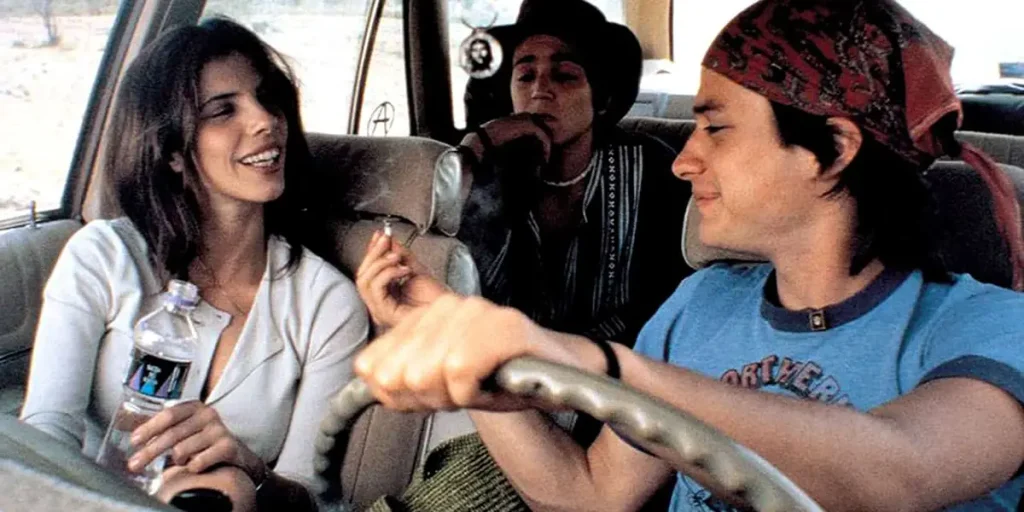Alfonso Cuarón’s Y Tu Mamá También is an extraordinarily compelling road trip centred on two sex-crazed teenagers in 90s Mexico.
Director: Alfonso Cuarón
Genre: Drama, Road Trip, Coming of Age
Run Time: 106′
Rated: R
Release Date: March 15, 2002
Where to Watch: On digital & VOD, and on DVD & Blu-Ray
When it initially played in cinemas back in 2001, Alfonso Cuarón’s Y Tu Mamá También ended up being quite the unexpected success. Not only was it a big box office hit in Mexico, but it also established Cuarón as one of said country’s most interesting directorial voices. And it even got him the job of directing the third (and best) Harry Potter movie, 2004’s The Prisoner of Azkaban.
But most importantly, the film showed that teenage sexuality and intimacy could be portrayed realistically and without censorship in a mainstream production, even if both the United States’ and Mexico’s ratings boards wouldn’t allow teenagers to watch it without adult supervision.
Y Tu Mamá También can even be used as an example of some countries’ double standards when it comes to sex vs violence. Death and suffering can be shown in Western films for teenagers, as long as not a lot of blood or gore is included. But the moment a nipple or a sex act appears, most movies are classified as “for adults only”. This is particularly absurd in the case of a movie like Y Tu Mamá También, considering its two main characters are teenagers, doing what most cis teenage boys tend to do, even nowadays: talk about sex and girls, masturbate, and of course, have sex. But for some reason, audiences who are the same age as the film’s protagonists aren’t technically allowed to watch it.
But I digress. Even though there’s a lot that can be said about the way Y Tu Mamá También was treated when it was first released in cinemas, a lot more can be written about the film itself. And that’s because Y Tu Mamá También is an extraordinary motion picture. By centring on two privileged Mexican teenagers who try to have sexual experiences with an older woman in a troubled sociopolitical context, the story ends up telling us a lot about both teenage sexuality and the kinds of inequalities we frequently see in Latin America. What initially seems to be yet another sex-crazed teenage road trip ends up being something more.
Y Tu Mamá También takes place in 1999, and tells the story of best friends Tenoch (Diego Luna, of Rogue One and Andor) and Julio (Gael García Bernal, of Mozart in the Jungle and Werewolf by Night). The former comes from privilege and wants to be a writer, despite his family’s wishes. And the latter is upper middle class, still privileged when compared to the rest of the country, but not as much as his friend. They have both finished high school, so they spend the summer going to parties, frequenting an empty country club, and of course, talking about sex and even masturbating in each other’s presence.
At least at the beginning, Tenoch and Julio have a very intimate sort of friendship. They’re ostensibly heterosexual –the film starts with each of them having explicit sex with their soon-to-be-absent girlfriends–, but they don’t mind showering in front of each other, making fun of each other’s penises, and even masturbating at the same time, while –supposedly– thinking of women they know, or celebrities like Salma Hayek. One could think it’s a healthy sort of friendship; maybe it’s a bit homoerotic, but of course, Y Tu Mamá También has other plans regarding their relationship.
They both end up at a political gathering organised by Tenoch’s father, in which they meet Luisa (Maribel Verdú, of Pan’s Labyrinth), the Spanish wife of Tenoch’s cousin. They offer her a trip to a nearby beach, and she refuses. But when she later finds out her husband is cheating on her, she calls the boys to tell them she accepts, and thus, the road trip starts. What begins as an innocent-enough adventure ends up transforming into an exploration of sexuality, friendship, and even grief.
What Cuarón has done with Y Tu Mamá También is to take a truly American format— the road trip —and transform it into something distinctly Mexican, centred on the political and social realities of that country during the late 1990s. Our protagonists come from privilege, and thus, don’t seem to take notice of the obvious inequalities and poverty that surround them. Cuarón places them in contrast with much less privileged people, making them talk banalities while they drive next to a protest, or nearby shanty towns.
It’s the kind of reality that’s still all-too-common in Latin America, even today, and Cuarón makes sure to portray it in the most realistic manner possible. For example, we see Tenoch being served food by a maid who treats him like a son; something that happens all the time, as maids end up raising the kids of rich people, while the latter spend most of their days at work. And we also see our main characters talk about college and their professional ambitions, as well as trips to Europe or the States, while they’re surrounded by political protests, or police officers “randomly” stopping drivers on the highway.

We’re even told that Tenoch’s father is an important politician, but that he’s corrupt; so much so that, years earlier, the kid and his family had to flee to Canada for eight months for dubious reasons. Curiously enough, we don’t learn as much about Julio’s family, probably because there’s not as much to say. In any case, all of this is conveyed through expertly executed narration. Often, narration can be used in films as a sort of shortcut to say what couldn’t be said through traditional dialogue and character interaction, but in Y Tu Mamá También, it’s used for interesting asides, or to transmit information about future events the audience normally wouldn’t be privy to.
Thus, the narrator becomes another character: a neutral or objective one, who tells the audience information that enriches the protagonists’ development, and ensures the political and social commentary makes sense. After all, Y Tu Mamá También is all about teenagers with little life experience and even less awareness of the kind of society they live in, and the way they’re forced to grow up. Through Tenoch and Julio’s interactions (both dramatic and sexual) with Luisa, they start realising how inexperienced they are with sex, and most importantly, what kinds of feelings they have for one another.
Now, it’s true that Y Tu Mamá También is a very sexually explicit movie. It starts with sex, and it doesn’t shy away from showing its main characters’ genitals, as well as Maribel Verdú’s naked body, both during sex scenes and when she’s sunbathing at the beach. But the film never feels pornographic or gratuitous, as Cuarón, with the help of cinematographer Emmanuel Lubezki (of Birdman and Gravity), makes sure to avoid the male gaze, using hand-held oners and wide shots to give the movie a documentary-like feel. There aren’t any close-ups of body parts or lengthy, romanticised sex scenes. In fact, both Tenoch and Julio last less than two minutes whenever they have sex with someone, showing that they are inexperienced and too-eager teenagers, and not idealised sex gods, created exclusively with male audience members in mind.
In that sense, Y Tu Mamá También feels refreshing. It feels refreshing because it shows the realities and imperfections of sex, and because it’s about sex not in an erotic manner, but in a more realistic and character-based way. Our male characters learn and grow through their sexual experiences, and Luisa tries to find something, anything, by travelling with her younger companions and having sexual experiences with them. Evidently, Y Tu Mamá También is not directed at a conservative audience, but at viewers who don’t mind watching young people acting as young people, having sexual encounters that don’t feel neutered or censored.
Now, even though our protagonists are Tenoch and Julio, who are expertly portrayed by real-life best friends Diego Luna and Gael García Bernal, the most interesting character ends up being Verdú’s Luisa. At first, she seems to be playing the stereotypical femme fatale; the idealised version of a sex-hungry “older” woman who gives her younger companions what they want. But as the movie plays, we see there’s something more to her. We see her crying by herself in her hostel room. We see her talking to her ex on the phone, clearly distressed. And we see her interacting with a fisherman’s kids, being told that she should be a mother by now, and shrugging at the comment instead of giving a clear answer.

But it’s a revelation late in the proceedings, which ends up cementing Luisa as the film’s emotional core. It doesn’t only feel tragic, but it also recontextualises most of her previous actions and turns her into a complex human being. She doesn’t go on a road trip with two horny teenagers just because she is horny herself. She does it because she needs to find something in said trip; because, after her husband’s betrayal, she needs to have certain experiences and live life without worrying about consequences, maybe helping two troubled and directionless teens in the process. Instead of being a walking cliché, Luisa turns into Y Tu Mamá También’s biggest surprise.
Even though, as a fan of Alfonso Cuarón, I don’t think he’s ever made a less-than-interesting film, I consider Y Tu Mamá También to be one of his best. By telling the story of two horny and privileged teens and their older female companion, he ends up saying a lot about sex, power, corruption, social issues and even the gender spectrum, years before the latter concept became more well-known. But Y Tu Mamá También is also an expertly directed film, full of impressive –yet somewhat invisible– oners, excellent performances, and an ending that couldn’t be more perfect and emotionally potent. Y Tu Mamá También hasn’t aged at all, and feels as relevant and rebellious as it did twenty-four years ago.
Y Tu Mamá También: Movie Plot & Recap
Synopsis:
Two Mexican teenagers decide to go on a road trip to a paradisiacal beach with the Spanish wife of one of their cousins, experimenting with sex in the process.
Pros:
- Excellent performances.
- An honest portrayal of sex and intimacy.
- Emotionally potent.
- Emmanuel Lubezki’s amazing cinematography.
- More complex than it might initially appear.
Cons:
- Pretty much nothing.
Y Tu Mamá También is now available to watch on digital and on demand, and on DVD and Blu-Ray.
Loud and Clear Reviews has an affiliate partnership with Apple, so we receive a share of the revenue from your purchase or streaming of the films when you click on some of the links on this page. This won’t affect how much you pay for them and helps us keep the site free for everyone.

